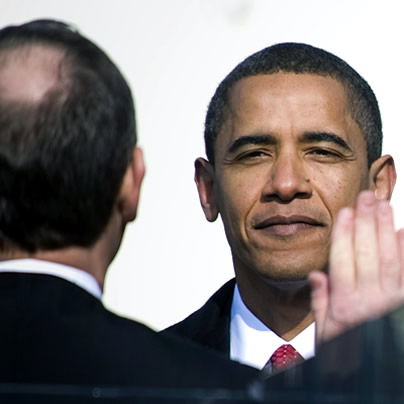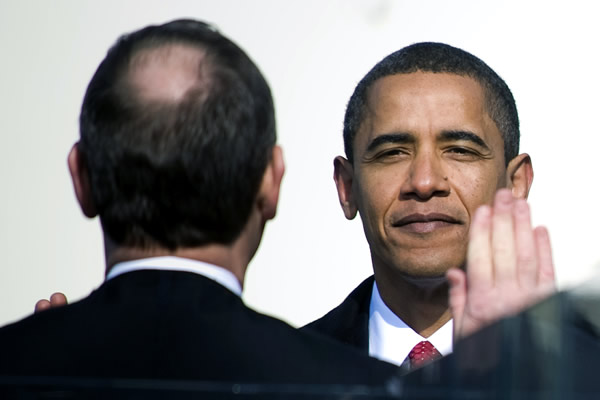National
High hopes for Obama’s second term
LGBT advocates seek continued advances in coming years


President Obama will have two swearing-in ceremonies next week for his inauguration. (Public domain photo by Petty Officer 1st Class Chad J. McNeeley, USN)
Amid festivities from one end of Pennsylvania Avenue to the other, President Obama will officially begin his second term on Monday while LGBT advocates have high hopes for the actions he might undertake in the next four years.
There will be two swearing-in ceremonies for Obama. On Sunday, the president will be sworn into office by Chief Justice John Roberts in the Blue Room of the White House, where he’ll place his hand on the Robinson family Bible when he takes the Oath of Office. A public ceremony will take place on Monday at the Capitol Building, where Obama will place his hand on two Bibles: one from President Lincoln, the other from Dr. Martin Luther King, Jr.
Following the public ceremony on Monday, Obama will deliver his inauguration speech before an anticipated crowd of 500,000 to 800,000 people on the National Mall. The inaugural parade will begin at 2:30 p.m. and will proceed down Pennsylvania Avenue from the Capitol to the White House.
The area for non-ticketed viewing is between Fourth Street Northwest and the Washington Monument on the National Mall, which can be entered on Constitution Avenue at 7th, 9th or 12th streets, N.W. and also on Independence Avenue, S.W. at 7th and 12th streets. In addition to the obvious closure of Pennsylvania Avenue, both the Third and 12th Street tunnels will be closed as well as the Memorial Bridge.
Obama begins his second term after noteworthy accomplishments for the LGBT community — including coming out in favor of marriage equality and repealing “Don’t Ask, Don’t Tell” — and expectations remain high for administrative actions to advance LGBT issues in the next few years.
Rea Carey, executive director of the National Gay & Lesbian Task Force, said Obama “got off to really rough start” by taking some controversial actions — such as withholding support for marriage equality and issuing a legal brief in favor of the Defense of Marriage Act that was riddled with anti-gay language — but noted an “increasingly productive tone” by the end of the his term.
“If you look at the very early on rough start and then how far the administration and President Obama came within that four years, it is significant,” Carey said. “To go from in the very first months huge missteps around, in particular marriage, to his last year of this term coming out publicly as the first president in support of our marriages, it’s a huge shift.”
Richard Socarides, a gay New York-based advocate, said Obama “delivered in a major way” during his first term on LGBT issues, but will be expected to build on the progress right away at the start of his second term.
“All indications are that the president has the opportunity to very strongly build on a great first term record,” Socarides said. “Obviously, there was some tension along the way, but people feel good about what he was able to accomplish in the first term. But on the eve of the second term, the big issues are going to come up right away.”
Administrative action is seen as the way forward for many LGBT issues because the Republican-controlled House is expected to block any meaningful legislation from passing Congress.
The requests from the LGBT community are already well-established and many of them must be undertaken within a few weeks after Obama is sworn in for his second term. A list of some of the more prominent requests follows:
• the reaffirmation from defense secretary nominee Chuck Hagel during his Senate confirmation hearings on Jan. 31 that he’ll support LGBT military families and extend partner benefits and non-discrimination protections upon the taking the helm at the Pentagon;
• the filing of a friend-of-the-court brief by the Justice Department before the Supreme Court prior to the Feb. 28 deadline to assert same-sex couples have a fundamental right to marry under the U.S. Constitution as justices consider the constitutionality of California’s Proposition 8;
• signing an executive order prohibiting federal contractors from discriminating on the basis of sexual orientation to continue receiving federal awards, a move that would cover between 400,000 and 600,000 LGBT workers;
• the appointment of LGBT officials to prominent positions in the administration, such as Cabinet-level positions or G-20 ambassadorships — particularly with prominent vacancies at the head of the Commerce Department, Labor Department and Department of the Interior;
• holding in abeyance the marriage-based green card applications of married bi-national same-sex couples to ensure these families aren’t separated before the Supreme Court makes a final determination on the constitutionality of the Defense of Marriage Act.
But Carey cautioned that some of the advances to come may be more low-key internal changes within the administration — such as the inclusion of LGBT questions on the hundreds of federal surveys conducted each year.
“The results for those surveys determine the flow of money and the flow of attention from the federal government to communities around the country,” Carey said. “Currently, our community is basically rendered invisible when it comes to those surveys, which means that our community is not getting the funding for our community-based organizations, for youth services, for any number of services around the country.”
Shin Inouye, a White House spokesperson, responded to calls for continued attention to LGBT issues by noting progress made in the first four years.
“President Obama is proud of the many accomplishments he’s achieved on LGBT equality during his first term, and he looks forward to building on that progress in the months and years to come,” Inouye said.
Already, Obama was faced with a controversy over the choice of an inaugural speaker. In 2009, Pastor Rick Warren of the California-based Saddleback Church was selected to give the inaugural benediction — and remained in place — despite outcry over his support for Prop 8.
This time around, things are different. Pastor Louie Giglio of the Georgia-based Passion City Church said he would “respectfully withdraw” from the same duties after an anti-gay sermon from the 1990s came to light in which he advocated for widely discredited “ex-gay” therapy and urged Christians to stop the “homosexual lifestyle” from being accepted in society.
In his place, the committee has selected Rev. Luis Leon of the D.C.-based St. John’s Church near the White House, to deliver the benediction. His church, which is often attended by Obama, is known for its pro-LGBT atmosphere. According to The Huffington Post, it has had openly gay, non-celibate priests and a gay bishop in addition to announcing this summer that it would bless same-sex partnerships and ordain transgender priests. Leon also gave the inaugural benediction for President George W. Bush in 2005.
Carey said replacing Giglio as the inaugural pastor — as opposed to allowing Warren to stay on in 2009 while including gay Rev. Gene Robinson at another event hosted by HBO — certainly “feels like” a promising shift in terms of the expectations of tone that will be seen from the Obama administration on LGBT issues over the next four years.
“It feels like it, and I hope that tone continues,” Carey said. “For the inaugural committee and the administration to reverse course on someone they had already publicly announced as a key participant of the swearing-in day, I think, was not only a significant victory for our community, but it absolutely showed that this administration has moved in its understanding that prejudice coming from the inaugural swearing-in podium will not be tolerated in this country.”
State Department
State Department releases annual human rights report
Antony Blinken reiterates criticism of Uganda’s Anti-Homosexuality Act

Secretary of State Antony Blinken on Monday once again reiterated his criticism of Uganda’s Anti-Homosexuality Act upon release of the State Department’s annual human rights report.
“This year’s report also captures human rights abuses against members of vulnerable communities,” he told reporters. “In Afghanistan, the Taliban have limited work opportunities for women, shuttered institutions found educating girls, and increasing floggings for women and men accused of, quote, ‘immoral behavior,’ end quote. Uganda passed a draconian and discriminatory Anti-Homosexuality Act, threatening LGBTQI+ individuals with life imprisonment, even death, simply for being with the person they loved.”
Ugandan President Yoweri Museveni last May signed the law, which contains a death penalty provision for “aggravated homosexuality.”
The U.S. subsequently imposed visa restrictions on Ugandan officials and removed the country from a program that allows sub-Saharan African countries to trade duty-free with the U.S. The World Bank Group also announced the suspension of new loans to Uganda.
Uganda’s Constitutional Court earlier this month refused to “nullify the Anti-Homosexuality Act in its totality.” More than a dozen Ugandan LGBTQ activists have appealed the ruling.
Clare Byarugaba of Chapter Four Uganda, a Ugandan LGBTQ rights group, on Monday met with National Security Council Chief-of-Staff Curtis Ried. Jay Gilliam, the senior LGBTQI+ coordinator for the U.S. Agency for International Development, in February traveled to Uganda and met with LGBTQ activists who discussed the Anti-Homosexuality Act’s impact.
“LGBTQI+ activists reported police arrested numerous individuals on the basis of their sexual orientation or gender identity and subjected many to forced anal exams, a medically discredited practice with no evidentiary value that was considered a form of cruel, inhuman, and degrading treatment and could amount to torture,” reads the human rights report.
The report, among other things, also notes Ugandan human rights activists “reported numerous instances of state and non-state actor violence and harassment against LGBTQI+ persons and noted authorities did not adequately investigate the cases.”
Report highlights anti-LGBTQ crackdowns in Ghana, Hungary, Russia
Ghanaian lawmakers on Feb. 28 approved the Promotion of Proper Human Sexual Rights and Ghanaian Family Values Bill. The country’s president, Nana Akufo-Addo, has said he will not sign the measure until the Ghanaian Supreme Court rules on whether it is constitutional or not.
The human rights report notes “laws criminalizing consensual same-sex sexual conduct between adults” and “crimes involving violence or threats of violence targeting lesbian, gay, bisexual, transgender, queer or intersex persons” are among the “significant human rights issues” in Ghana.
The report documents Hungarian Prime Minister Viktor Orbán and members of his right-wing Fidesz party’s continued rhetoric against “gender ideology.” It also notes Russia’s ongoing crackdown against LGBTQ people that includes reports of “state actors committed violence against LGBTQI+ individuals based on their sexual orientation or gender identity, particularly in Chechnya.”
The report specifically notes Russian President Vladimir Putin on July 24 signed a law that bans “legal gender recognition, medical interventions aimed at changing the sex of a person, and gender-affirming care.” It also points out Papua New Guinea is among the countries in which consensual same-sex sexual relations remain criminalized.

The Cook Islands and Mauritius in decriminalized homosexuality in 2023.
The report notes the Namibia Supreme Court last May ruled the country must recognize same-sex marriages legally performed outside the country. The report also highlights the Indian Supreme Court’s ruling against marriage equality that it issued last October. (It later announced it would consider an appeal of the decision.)
Congress requires the State Department to release a human rights report each year.
The Biden-Harris administration in 2021 released a memorandum that committed the U.S. to promoting LGBTQ+ and intersex rights abroad.
The full report can be read here.
National
Same-sex couples vulnerable to adverse effects of climate change
Williams Institute report based on Census, federal agencies

A new report by the Williams Institute at the UCLA School of Law finds that same-sex couples are at greater risk of experiencing the adverse effects of climate change compared to different-sex couples.
LGBTQ people in same-sex couple households disproportionately live in coastal areas and cities and areas with poorer infrastructure and less access to resources, making them more vulnerable to climate hazards.
Using U.S. Census data and climate risk assessment data from NASA and the Federal Emergency Management Agency, researchers conducted a geographic analysis to assess the climate risk impacting same-sex couples. NASA’s risk assessment focuses on changes to meteorological patterns, infrastructure and built environment, and the presence of at-risk populations. FEMA’s assessment focuses on changes in the occurrence of severe weather events, accounting for at-risk populations, the availability of services, and access to resources.
Results show counties with a higher proportion of same-sex couples are, on average, at increased risk from environmental, infrastructure, and social vulnerabilities due to climate change.
“Given the disparate impact of climate change on LGBTQ populations, climate change policies, including disaster preparedness, response, and recovery plans, must address the specific needs and vulnerabilities facing LGBTQ people,” said study co-author Ari Shaw, senior fellow and director of international programs at the Williams Institute. “Policies should focus on mitigating discriminatory housing and urban development practices, making shelters safe spaces for LGBT people, and ensuring that relief aid reaches displaced LGBTQ individuals and families.”
“Factors underlying the geographic vulnerability are crucial to understanding why same-sex couples are threatened by climate change and whether the findings in our study apply to the broader LGBTQ population,” said study co-author Lindsay Mahowald, research data analyst at the Williams Institute. “More research is needed to examine how disparities in housing, employment, and health care among LGBT people compound the geographic vulnerabilities to climate change.”
Read the report
Federal Government
Lambda Legal praises Biden-Harris administration’s finalized Title IX regulations
New rules to take effect Aug. 1

The Biden-Harris administration’s revised Title IX policy “protects LGBTQ+ students from discrimination and other abuse,” Lambda Legal said in a statement praising the U.S. Department of Education’s issuance of the final rule on Friday.
Slated to take effect on Aug. 1, the new regulations constitute an expansion of the 1972 Title IX civil rights law, which prohibits sex-based discrimination in education programs that receive federal funding.
Pursuant to the U.S. Supreme Court’s ruling in the landmark 2020 Bostock v. Clayton County case, the department’s revised policy clarifies that discrimination on the basis of sexual orientation and gender identity constitutes sex-based discrimination as defined under the law.
“These regulations make it crystal clear that everyone can access schools that are safe, welcoming and that respect their rights,” Education Secretary Miguel Cardona said during a call with reporters on Thursday.
While the new rule does not provide guidance on whether schools must allow transgender students to play on sports teams corresponding with their gender identity to comply with Title IX, the question is addressed in a separate rule proposed by the agency in April.
The administration’s new policy also reverses some Trump-era Title IX rules governing how schools must respond to reports of sexual harassment and sexual assault, which were widely seen as imbalanced in favor of the accused.
Jennifer Klein, the director of the White House Gender Policy Council, said during Thursday’s call that the department sought to strike a balance with respect to these issues, “reaffirming our longstanding commitment to fundamental fairness.”
“We applaud the Biden administration’s action to rescind the legally unsound, cruel, and dangerous sexual harassment and assault rule of the previous administration,” Lambda Legal Nonbinary and Transgender Rights Project Director Sasha Buchert said in the group’s statement on Friday.
“Today’s rule instead appropriately underscores that Title IX’s civil rights protections clearly cover LGBTQ+ students, as well as survivors and pregnant and parenting students across race and gender identity,” she said. “Schools must be places where students can learn and thrive free of harassment, discrimination, and other abuse.”
-

 South America3 days ago
South America3 days agoDaniel Zamudio murderer’s parole request denied
-

 Maryland4 days ago
Maryland4 days agoMontgomery County police chief discusses arrest of trans student charged with planned school shooting
-

 Politics5 days ago
Politics5 days agoCourt records raise concerns about right-wing TikTok investor’s influence
-

 Commentary4 days ago
Commentary4 days agoWorld ‘isn’t much different today’












